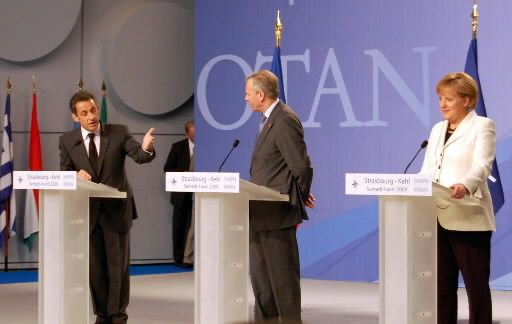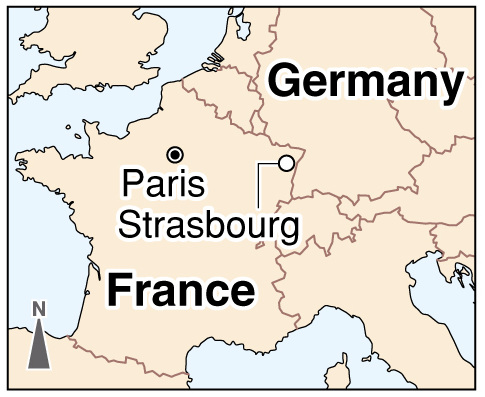Nuclear weapons can be eliminated: Chapter 5, Part 2
Jul. 20, 2009
Chapter 5: Unseen targets in the U.K. and France
Part 2: Self-reliance
by Yumi Kanazaki, Staff Writer
Deterrence: the ultimate guarantee
A summit marking the 60th anniversary of the founding of the North Atlantic Treaty Organization (NATO) was held in Strasbourg, France, in April. At a press conference on April 4 following the conclusion of the summit, Jaap de Hoop Scheffer, NATO secretary general, smiled broadly and said, “We welcome France’s decision to return to full participation in the NATO military command structure.” Standing beside Mr. de Hoop Scheffer, French President Nicolas Sarkozy responded with a smile and a flourish.
In 1966, France, which had been one of the core members of NATO since its establishment in 1949, withdrew from NATO’s military structure in opposition to the system led by the U.S. and the U.K. Though France’s return had a strong ceremonial meaning, in France and abroad it created the strong impression of a united NATO.
But, strictly speaking, France has not entirely returned. France is not a member of the Nuclear Planning Group (NPG), the only body among NATO’s 40 main committees that addresses the issue of nuclear policy.
At the offices of the French Defense Ministry in the heart of Paris, an official in charge of nuclear policy said flatly, “France’s nuclear deterrence will not be controlled by anyone else. That was one condition of our return to the NATO military structure.”
With its return, France has boosted its influence in NATO while maintaining its independence in terms of its nuclear capability. A strong will can be discerned, in contrast with the U.K., which maintains a close relationship with the U.S. and will provide part of NATO’s nuclear capability in an emergency.
I visited the French Institute of International Relations (IFRI), a think tank with offices in a quiet neighborhood in Paris. When I asked Dominique David, 59, the organization’s vice president, why France will not join the NPG, she smiled.
“The threat of the former Soviet Union has disappeared, and the NPG’s existence no longer has much significance,” she said. “And NATO’s nuclear strategy is controlled by the U.S. Even if France were to get involved, nothing would be gained.”
France is proud of its self-reliant diplomatic and defense policies, which were promoted by President Charles de Gaulle in the 1960s. “Those policies were backed by nuclear weapons,” Ms. David said. “France became a global power precisely because it had nuclear weapons. That is what the French believe.” The nation’s unwavering faith in nuclear deterrence underpins its history.
Mr. Sarkozy has his finger on France’s nuclear button. In March 2008 he gave a speech on defense policy in which he outlined disarmament measures France would take including cuts in the nuclear capability of its aircraft.
At the same time, he expressed his determination to modernize France’s nuclear capability saying, “My first duty as head of state and head of the armed forces is to ensure that France, its territory, its people, and its republican institutions are secure in all circumstances and that in all circumstances our national independence and decision-making autonomy are preserved. Nuclear deterrence is the ultimate guarantee of our national independence.”
(Originally published on June 22, 2009)
To comment on this article, please click the link below. Comments will be moderated and posted in a timely fashion. Comments may also appear in the Chugoku Shimbun newspaper.









